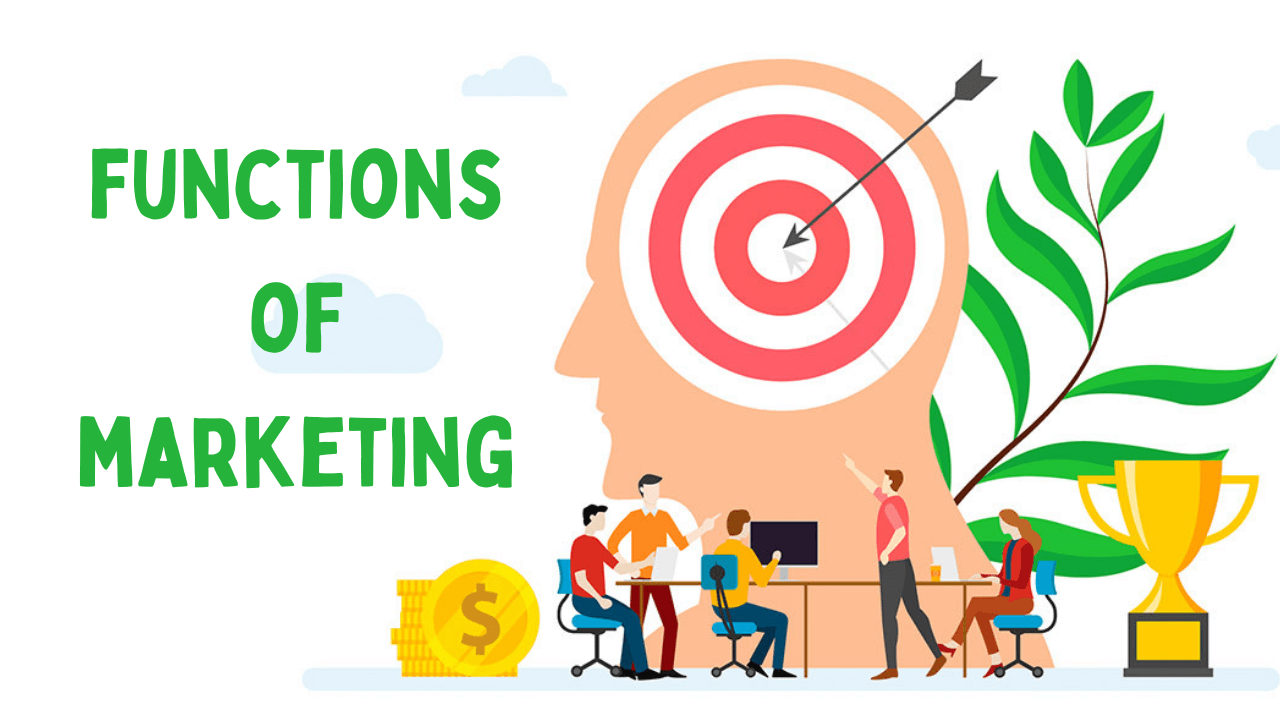Functions of Marketing Class 12 | Functions of Marketing Class 12 Notes
Functions of Marketing Class 12
Q. Explain the functions of marketing in detail. / What are the 7 main functions of marketing?
Ans.:
- Effective marketing is essential for the success of the business. Marketing deals with the exchange of goods and services to satisfy the needs of consumers.
- Marketing functions help to study the needs of the consumers and facilitate to satisfy them. Following are some of the important functions of marketing:

1. Marketing Research:
- Effective marketing is possible when a business takes initiative to identify the needs and wants of the consumers in the market.
- Marketing Research helps to make various decisions regarding the successful marketing of products.
- To identify the needs of the consumers, there is a need to collect information from the consumers and analyze the same known as Market Research.
2. Buying and Assembling:
- It involves collecting raw material from different sources at one place for production.
- This function is important as the quality and price of raw materials determine the cost and quality of the final product.
3. Market Planning:
- Market planning is the process of organizing and defining the marketing objectives of the business and creating strategies to achieve them.
- It is the comprehensive blueprint that will help to draw an outline business’s overall marketing efforts.
4. Product Development:
- Product development and design play an important role in the selling of the product.
- Product design includes decisions related to quality, standards, shape, design, packing, colour, etc. of the product.
- Good design of the product gives a competitive advantage to the business.
- Product development is a continuous process as the requirements of the customer change from time to time.
5. Standardisation and Grading:
- Standardisation means to determine standards related to the process, size, quality, design, weight, colour, etc. of the product. It helps in ensuring uniformity in the quality of the product. It helps in achieving customers’ loyalty towards the product.
- Grading is the process of the physical classification of products according to similar characteristics and/or quality. Grading is done based on features like size, shape, quality, etc. Generally, grading is done in the case of agricultural products like wheat, rice, potatoes, etc.
6. Packaging and Labelling:
- Packaging means designing the package for the product. It helps to avoid breakage, damage, and destruction of the product. Packing material includes bottles, containers, plastic bags, tin, wooden boxes, jute bags, bubble bags, packing foam, etc.
- The slip-on in which all this information is provided is called a label and its process is called labeling.
- Packaging and labeling not only protect the product but also act as an effective tool for marketing.
7. Branding :
- Every businessman wants to have a special identity in the market for his product. Branding is the process of giving a special identity to a product through a unique brand name to differentiate it from a competitor’s products.
- In simple words, giving a distinct name to one’s product is called branding. Registered brands are known as Trademarks.
- Trademarks cannot be copied. Branding helps to get recognition among the consumers. It can help to get new business and increase brand awareness in the market.
8. Customer Support Service:
- The customer is the king of the market hence business needs to take necessary steps for the satisfaction of the customer.
- Business needs to take every possible effort to provide support services to the customer.
- The business can provide the support services like Pre-sales service, consumer helpline, after-sales service, technical assistance, product demo, etc. to the customers. These services help in getting, retaining, and growing the customers.
9. Pricing of Product:
- Pricing plays an important role in the market where there is cut-throat competition.
- While determining the price of the product businessman needs to consider factors like cost, desired profit, price of the competitor’s product, demand for the product, market condition, etc.
- Business needs to change prices as per the need of the market.
- If prices are too high, it might lose customers but if prices are too low, it might suffer losses. So, deciding the right price needs extensive market research.
10. Promotional Channels:
- Promotion is the process of informing the consumers about the products, their features, uses, prices, etc., and encouraging them to buy these products.
- Advertising, Personal selling, Publicity, and Sales Promotion are some of the important tools of promotion.
- Business uses a combination of all or some of these four methods for promotion as per the need of the business.
- Promotional activities help to increase brand awareness in the market.
11. Distribution:
- Distribution is the set of activities that are concerned with the efficient movement of finished goods from the place of production to the consumer.
- It includes transportation, warehousing, material handling, inventory control, order processing, market forecasting, packaging, plant and warehouse location, and customer service.
12. Transportation:
- Transportation means the physical movement of goods from the place of production to the place of consumption.
- Place utility is created by transportation activity.
- Road, air, water, railways, and pipelines are some of the important modes of transportation used by the business.
13. Warehousing:
- There is a time lag between the purchase or production of goods and their sale. It is important to store the goods in a safe place during this time lag.
- Warehouse helps to maintain a smooth flow of goods. It also helps in stabilizing prices in the market.
- The function of warehousing is performed by retailers, wholesalers, and manufacturers.
- Warehousing creates time utility
functions of marketing class 12 notes
12th OCM paper with solution| Organization of Commerce and Management
OCM Practice Paper 1 |
Download |
OCM Practice Paper 2 |
Download |
OCM Practice Paper 3 |
Download |
OCM Practice Paper 4 |
Download |
OCM Practice Paper 5 |
Download |
PRELIMINARY QUESTION PAPER FOR VARIOUS COLLEGES
OCM SET -1 |
Download |
OCM SET -2 |
Download |
OCM SET -3 |
Download |
OCM SET -4 |
Download |
OCM SET -5 |
Download |
Video Lectures of all chapters |
CLICK HERE |
OCM Digest PDF |
CLICK HERE |



Helpful information.